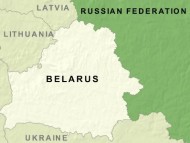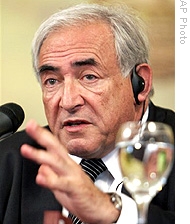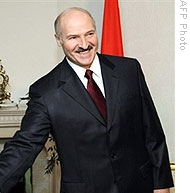VOA标准英语2009年-Belarus Gets $2.5 Billion Credit Line From IMF
搜索关注在线英语听力室公众号:tingroom,领取免费英语资料大礼包。
(单词翻译)
The International Monetary1 Fund, with the concurrence2 of the United States, has agreed lend Belarus $2.5 billion to help it deal with effects of the global economic crisis. The IMF decision Wednesday reflects a thaw3 in relations between the authoritarian4 government in Minsk and the United States and the rest of Europe. Belarus has joined several other European countries, including Iceland and Hungary, in gaining IMF credit lines to help it weather the financial crisis, which has caused the central European country's exports and currency reserves to wither5 in recent months.
Belarus has joined several other European countries, including Iceland and Hungary, in gaining IMF credit lines to help it weather the financial crisis, which has caused the central European country's exports and currency reserves to wither5 in recent months. |
| Dominique Strauss-Kahn's offer to Belarus must be approved by IMF's governing board, (file photo) |
The managing-director of the Washington-based IMF, Dominique Strauss-Kahn of France, announced the 15-month stand-by credit arrangement Wednesday. The IMF governing board must still approve the offer, but that is considered pro-forma.
Belarus, which recently obtained a two-billion-dollar loan from neighboring Russia, sought the IMF credit line in October as its monetary reserves dwindled6 along with income from key exports such as potash and refined oil products.
The IMF agreement marks a further easing of the international isolation7 of the government of President Alexander Lukashenko.
The former Soviet8 official has ruled the country with an authoritarian hand since 1994, but has recently made a number of conciliatory gestures to the West including the release of the last three government detainees considered political prisoners.
 |
| Alexander Lukashenko has recently made some conciliatory moves toward the West (file photo) |
Asked about the IMF decision, State Department Acting9 Spokesman Gordon Duguid said U.S. efforts to engage with the Minsk government have produced at least some limited gains.
'The Belarusians have a long way to go, particularly on their human rights record. However, the engagement that we've started with the Belarusians has produced some results," he said. "This is not to say we'll stop reminding them that their human rights record needs much improvement, that their process for starting a more representative form of government needs to be much improved. But we're doing that through engagement."
The Bush administration welcomed the release last August of the remaining Belarusian political prisoners including opposition10 figure Alexander Kozulin, and opened a high-level dialogue with the Minsk government.
However, it joined European allies in expressing disappointment over the conduct of parliamentary elections in Belarus in September that did not yield a single seat for opposition candidates and which the Organization for Security and Cooperation in Europe, the OSCE, said fell short of international standards.
Spokesman Duguid said another problem issue in the bilateral11 relationship is the case of Emanuel Zeltzer, a Russian-born U.S. citizen convicted of industrial espionage12 in Belarus in August and given a three-year prison term.
He said the United States has no way to assess the fairness of the case against Zeltser because his trial was closed. The United States continues to call for his release on humanitarian13 grounds because of reports he is failing health.
 收听单词发音
收听单词发音 




